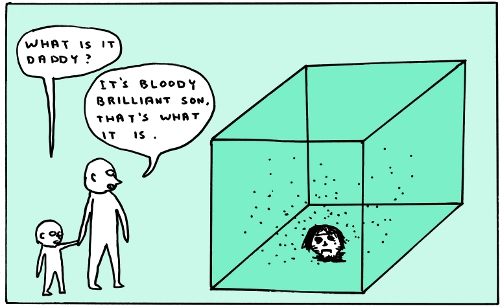“Sometimes it occurs to me that the job of a serious cultural critic mostly consists in telling the generality of people that their opinions – on films, on books, on all manner of widgets, gadgets and even the latest electronic fidgets – simply aren’t up to scratch. It’s a dirty, thankless task, but someone has to do it; someone has to point out that, no, Inception wasn’t the last word in SF meta-sophistication, but rather a stupid person’s idea of what an intelligent film is like. And by the same token, as the Coen brothers’ True Grit comes galloping into our multiplexes surrounded by dust clouds of Stateside approbation, someone has to take a bead on the whole sweep of their careers, squint, and then if not exactly shoot them down, at any rate cold-cock the notion that the Coens are the great American auteurs of their generation, when, sadly, they are only a moderately clever person’s idea of what great American auteurs might be like.
“Either of the two films that preceded True Grit, Burn After Reading (2008), and A Serious Man (2009), would have been a career-finisher for a tyro writer-director. Halfway through the latter I asked my wife what she thought of it and she replied “Awful”. I demurred: “It’s pretty dreadful . . .”, and she shot back: “In what precise way does that differ from ‘awful’?” I set down this exchange because I think it encapsulates a lot of what has enabled the Coens to continue to ride high in popular estimation – and to win Oscars, rake in receipts and put bums on plush – which is that they are insistently likeable film-makers. Their likeability is such – and is projected in such a canny way through their nebbish male characters, and resourceful female ones – that it seems like a solecism to criticise them too strenuously.
“I’ve taken this line myself in the past. Recall: True Grit isn’t the only remake the Coens have shot; back in 2004 when I was writing regularly as a film critic, they brought out The Ladykillers, a remake of the Ealing Studios classic, with Tom Hanks taking on the role of the Professor, originally played by Alec Guinness. The film was pretty crap; the performances hammy rather than buffo, the narrative pace feeble rather than farcical – but such was the amiability of the exercise, and my own reservoir of affection for what the Coens apparently represent – namely, considered, intelligent, witty film-making in an era characterised by crassly merchandising blockbusters – that I gave The Ladykillers a decent review.”
Read the rest of Self’s take on the Coen brothers at the Guardian here.


